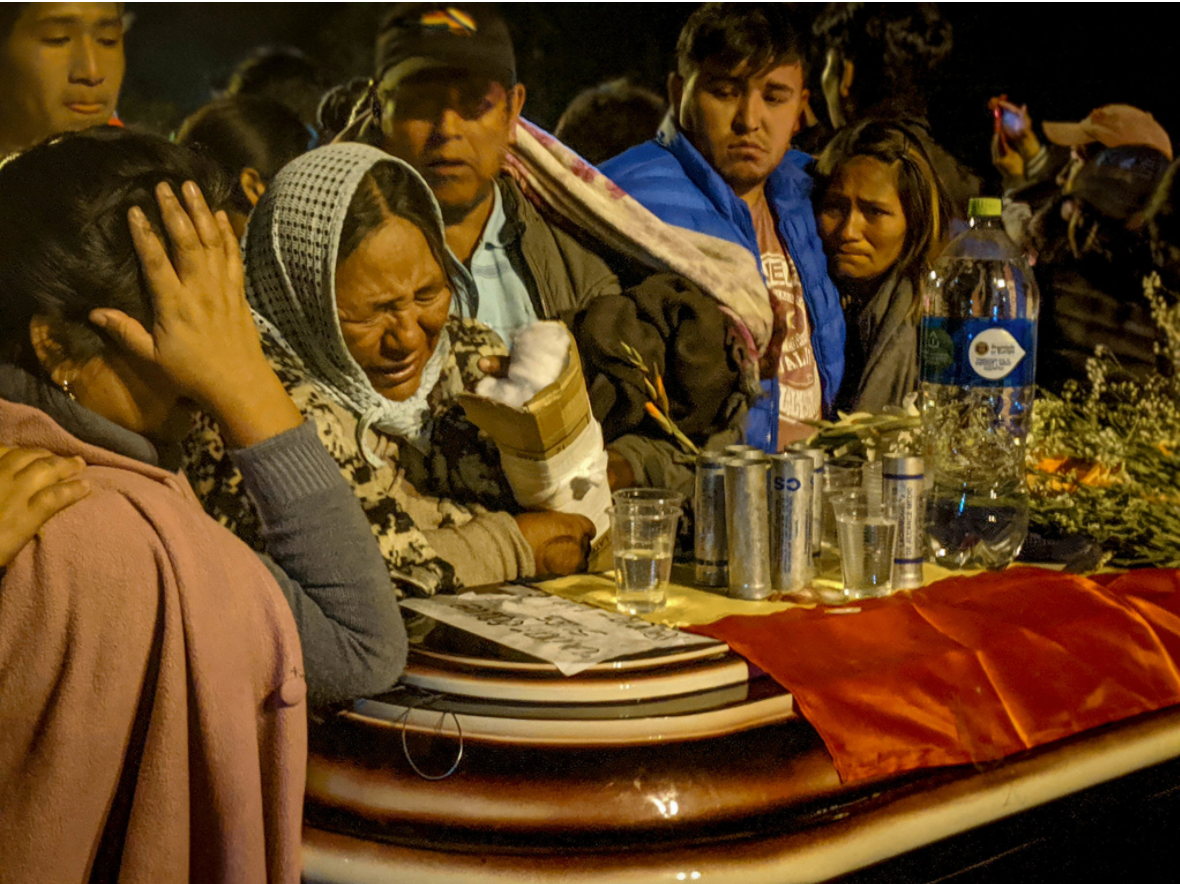via HRP Blog
Advocates call for a stop to state repression and violence, a turn to accountability, and a clear path to free and fair elections

Gregoria Siles mourns the death of her son Omar Calle hours after soldiers shot and killed him in Sacaba. Photo Credit: Thomas Becker 2019.
(Cambridge, MA, July 27, 2020) –– Four days after the Interim Bolivian Government suspended elections again, Harvard Law School’s (HLS) International Human Rights Clinic and the University Network for Human Rights (UNHR) released a report on the gross human rights abuses carried out under Bolivia’s interim President, Jeanine Áñez. The report documents one of the deadliest and most repressive periods in the past several decades in Bolivia as well as the growing fear of indigenous peoples and government critics that their lives and safety are in danger.
“We have identified very troubling patterns of human rights violations since the Interim Government took power. These abuses create a climate where the possibility of free and fair elections is seriously undermined,” said Thomas Becker, an international human rights attorney with UNHR and a 2018-2020 clinical instructor in HLS’s International Human Rights Clinic.
Áñez assumed power on November 12, 2019 with the mandate of calling new elections by January 2020. Under her administration, Bolivia has endured a surge of human rights violations. Shortly after Áñez took power, state forces carried out operations that killed at least 23 Bolivian civilians, all indigenous, and injured over 230. These casualties make November 2019 the second-deadliest month in terms of civilian deaths committed by state forces since Bolivia became a democracy nearly 40 years ago.
Since November, the interim government has continued to persecute people that it perceives to be outspoken opponents of the Áñez administration. The government has intimidated the press, shutting down critical news outlets and arresting “seditious” journalists. Áñez’s forces have arrested or detained hundreds of former politicians for vague crimes such as “sedition” and “terrorism.”
The HLS and UNHR report offers recommendations to the interim government to enforce its domestic and international obligations. First among these recommendations is that the interim government fulfill its commitment to hold free and fair presidential elections as quickly as possible.
“We are spiraling deeper into authoritarianism,” warned Felipa López Apaza, whose brother Juan was killed in Black November. “We need elections as soon as possible or they will keep coming after us.”
Media Contacts:
Thomas Becker: thomas@humanrightsnetwork.org
Joshua Petersen: media@humanrightsnetwork.org
Dana Walters: dwalters@law.harvard.edu
Acknowledgments
This report was researched and written by Fabiola Alvelais, JD ’20, Laura Clark, JD ’20, Mohammed Elshafie, JD ’20, Rund Khayyat, JD ’21, Delany Sisiruca, JD ’21, Nicolas Walker, JD ’21, Julia Wenck, JD ’20, and Clinical Instructor Thomas Becker, JD ’09, of Harvard Law School’s International Human Rights Clinic; Camila Bustos, JD ’21, Hannah Carrese, JD ’22, Luke Connell, JD ’22, and Executive Director of the University Network for Human Rights and Sidley Austin–Robert D. McLean Visiting Professor of Law James Cavallaro of Yale Law School; and Gemma Canham, BA ’20, of Queen’s University Belfast. The report was translated by Belén García Martínez. The researchers wish to thank the many individuals who were willing to speak with us and share their stories to make this report possible.
Filed in: Legal & Policy Work
Tags: Bolivia, HRP, Human Rights Program, IHRC, International Human Rights Clinic, University Network for Human Rights
Contact Office of Clinical and Pro Bono Programs
Website:
hls.harvard.edu/clinics
Email:
clinical@law.harvard.edu